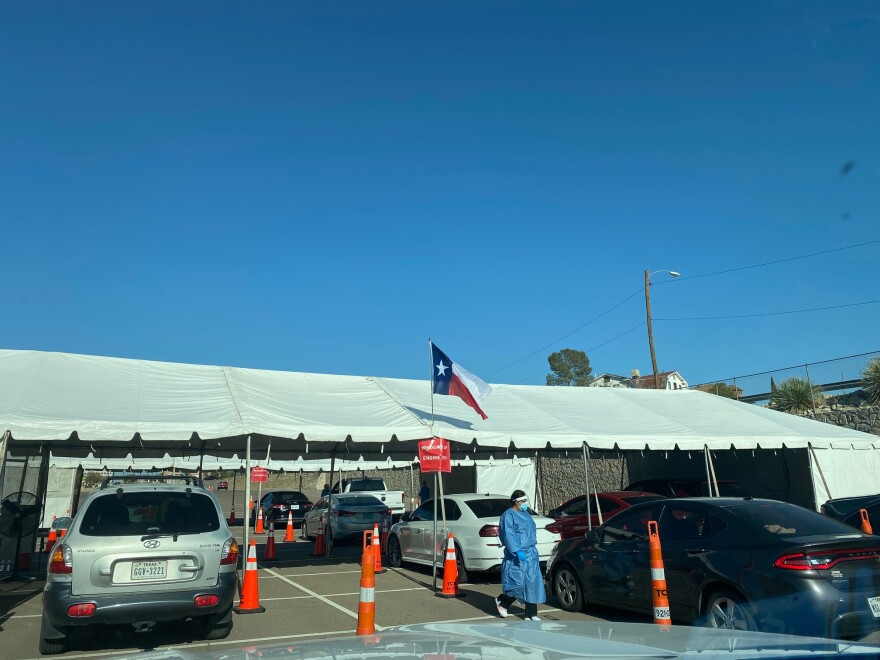EL PASO -- El Paso is struggling with contact tracing, a crucial means of slowing the spread of COVID-19, as it experiences one of the nation’s worst outbreaks of the disease.
In recent weeks, the number of people notified within 48 hours that they were exposed to someone who tested positive for COVID-19 plummeted from 88 percent on Oct. 1 to 32 percent on Oct. 23, the day a record 1,216 El Pasoans tested positive for the novel coronavirus.
The decline comes as more people rush to get tested and the need for contact tracing grows. “So you can see, it's a multifactorial storm that has come together to create this terrible sort of community spread or epidemic that we have,” said Dr. Ogechika Alozie, an infectious disease expert and chief medical officer at Del Sol Medical Center in El Paso.
“We can't get test results back fast enough. We can't notify people fast enough. Not enough of the people are responding to contact tracing. And we don't have that sort of precision around where exactly the cases are coming from to target. And so we were really looking at some troubling times in the next three or four weeks,” he said.
Contact tracers are supposed to quickly get in touch with people who test positive and then follow up with those they’ve been in contact with, to notify them to try to prevent them from infecting others. The number of new cases has soared to more than 10,000 In the last three weeks creating a huge workload for contact tracers in El Paso.
“At these number of positive cases a day it is a difficult task so we’re looking at expanding what we can do,” said El Paso Fire Chief Mario D’Agostino. El Paso set a goal of having 300 contact tracers but currently has 270, according to D’Agostino. He says that’s still enough to get the job done even as the city’s own data shows contact tracers are struggling to keep up with cases.
El Paso Mayor Dee Margo urged residents in a press conference on Thursday to stay home for a minimum of two weeks, as the number of new COVID-19 cases reported in the city reached an all-time high of 1160 that day – more than double the day before. The city set another record on Saturday with 1216 new cases. Hospitals are ont the verge of reaching capacity and are making arrangements to airlift some non-COVID patients to other Texas cities for critical care.
During the grim press conference, Margo reminded people behind the record numbers, there are family members, “a mother, a father, grandmothers, grandfathers, brothers, sisters and children, a member of a family – our family.”
As COVID-19 spreads through the city, contact tracing is critical to fighting the virus.
El Paso County Commissioner David Stout is concerned about a possible breakdown in the contact tracing process. He saw the problem first-hand when his own assistant tested positive.
“It’s been at least three weeks since he tested positive and he never got a call from the health department to interview him about where he had been and who he had been in contact with,” Stout said.
That 24-year-old assistant had symptoms but is now back to work. After talking about his assistant’s experience in County Commissioners Court, Stout said he heard from other El Pasoans who tested positive but never got a call from a contact tracer. He also reached out to a COVID-19 survivors’ group on Facebook and heard from about two dozen more people who were not contacted in a timely manner or at all.
He added that contract tracing is key for lifting emergency orders for businesses now forced to operate with reduced hours and half capacity. “If we’re opening up the economy without doing contact tracing, it's really dangerous in my opinion because we don’t know where the virus is and where it’s going,” Stout said.
During the Oct. 15 news conference where Mayor Dee Margo announced new restrictions on businesses, City Health Department Director Angela Mora said contact tracers were working seven days a week. “Now it’s probably 18 to 20 hours a day. We are working all of us extended hours.”
Mora said if someone doesn’t get a call from a contact tracer within 24 hours after testing positive, “it could be an indication that we did not get the person’s lab results.”
She urged people with positive results to stay home and call the health department with a list of their contacts who may have been exposed.
The city has begun to send contact tracers to people’s homes when they don’t answer the phone.
“If the individuals are not answering their phones and we are unable to talk to them and provide the guidance necessary to protect themselves and others, then what we are doing is we are issuing health orders that are hand-delivered,” Mora said. Those who don’t comply with orders to stay home and quarantine for 10 to 14 days face fines.






